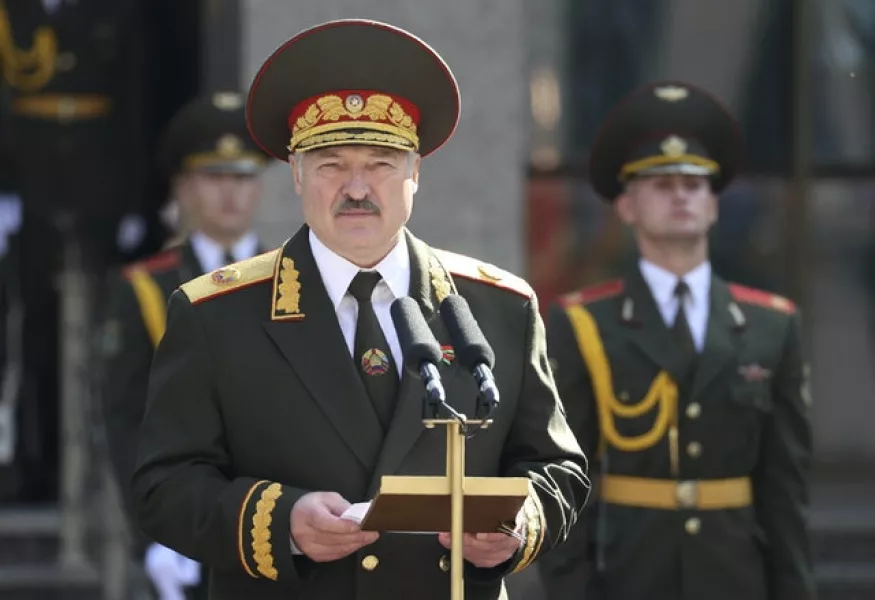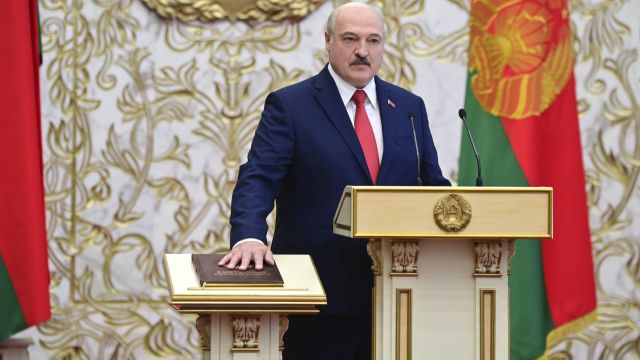It comes amid weeks of huge protests over his re-election, which the opposition says was rigged.
Several European countries used the occasion to reiterate they do not recognise the results of the election and refuse to regard Mr Lukashenko as the legitimate president.

The ceremony was held in front of several hundred dignitaries at the Palace of Independence in the capital of Minsk on Wednesday.
Police and other security forces blocked off parts of the city and public transport was suspended.
Mr Lukashenko, 66, took the oath of office in Belarusian with his right hand on the constitution, while the head of the Central Election Commission handed him the official ID card of the president of Belarus.
“The day of assuming the post of the president is the day of our victory, convincing and fateful,” he said.
“We were not just electing the president of the country – we were defending our values, our peaceful life, sovereignty and independence.”
The absence of public involvement in the inauguration only proved that Mr Lukashenko lacked a valid mandate to continue leading the country, according to his political opponents and European officials.

Steffen Seibert, spokesman for German Chancellor Angela Merkel, said: “Even after this ceremony today, Mr Lukashenko cannot claim democratic legitimisation, which would be the condition to recognise him as the legitimate president of Belarus.”
He added the secrecy surrounding the swearing-in was “very telling”.
Mr Lukashenko has run Belarus, a former Soviet nation of 9.5 million, with an iron fist for 26 years.
Official results of the country’s August 9 presidential election had him winning 80% of the vote.
His strongest opponent, Sviatlana Tsikhanouskaya, got 10%.
Ms Tsikhanouskaya, who is in exile in neighbouring Lithuania after being forced to leave Belarus, says the outcome was invalid, as have the tens of thousands of her supporters who continue to demand Mr Lukashenko’s resignation during more than six weeks of mass protests.
“The people haven’t handed him a new mandate,” she said, adding the inauguration was “a farce” and an attempt by Mr Lukashenko to “declare himself legitimate”.
“I, Sviatlana Tsikhanouskaya, am the only leader that has been elected by the Belarusian people.
“And our goal right now is to build the new Belarus together.”

The United States and the European Union have questioned the election and criticised the brutal police crackdown on peaceful protesters during the first few days of demonstrations.
The EU is pondering sanctions against top Belarusian officials but failed to agree on imposing them this week.
Protests have rocked the country daily since the election, with the largest rallies in Minsk attracting up to 200,000 people.
In the first three days of protests, police used tear gas, truncheons and rubber bullets to disperse crowds.
Several protesters died, many were injured and more than 7,000 were detained.
The Viasna human rights group said several protesters were detained near the palace on Wednesday, holding banners that read “the king has no clothes” and “victory (will belong to) the people”.
Mr Lukashenko has bristled at suggestions of starting a dialogue with the opposition.
Amid international outrage over the violent crackdown on the protests, Belarusian authorities switched to prosecuting top activists.
Many members of the Coordination Council that was formed by the opposition to push for a transition of power have been arrested or forced to leave the country.
A prominent council member, Pavel Latushko, compared the inauguration to a “gathering of thieves” and refused to recognize Mr Lukashenko as president.
“For us, the citizens of Belarus, for the international community, he is a nobody,” he said.
“An unfortunate error of history and a disgrace of the civilised world.
“We will never agree with the falsification (of the election) and are demanding a new vote.
“We urge everyone to engage in indefinite civil disobedience.”







